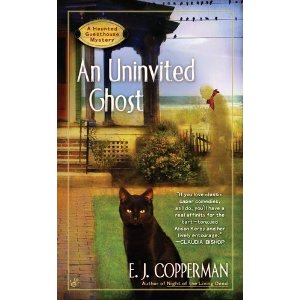Just wanted to recap this year’s Deadly Ink Conference, which took place at the Sheraton Parsippany in NJ. As usual, it offered a lively mix of entertaining presentations, helpful information for both writers and readers, and general networking and bonding among all concerned.
Friday night’s Deadly Dessert Party introduced Guest of Honor Gillian Roberts, author of the award-winning Amanda Pepper mystery series, and Toastmaster (mistress?) Cheryl Solimini, author of the novel ACROSS THE RIVER from Deadly Ink Press.
I started Saturday off by attending the panel, “What Makes It a Mystery?” M. E. Kemp acted as moderator, as E. J. Rand, Ilene Schneider, Gillian Roberts and Hallie Ephron dissected the variations among mysteries, from cozies to thrillers. Ephron recommended that aspiring writers should learn “what’s cliché in your subgenre.” Rand and Roberts, who both write sleuth characters who meet and marry within their series, discussed mixing mystery and romance. Ephron noted, “In many mysteries, there’s the story of the detective and the story of how he or she solves the crime. In the story of the detective, romance can play a part.”
I stuck with Hallie Ephron for her workshop on “Writing Suspense.” She defined suspense as “the potential for something bad to happen—that moment before something bad happens, or doesn’t happen.” She advised building tension by “slowing down” the writing, and distinguished between the “false payoff,” where something innocuous happens, versus the “true payoff,” where something dramatic occurs. She read a taut scene by Dick Francis that built suspense through pure description, with no clue as to the protagonist’s physical or emotional reactions.
Next, novelist and retired forensic psychologist Rick Helms gave a workshop on “Inductive and Deductive Profiling.” He said much of what we see demonstrated in movies and TV is inductive profiling that generalizes about a group of people to catch one individual. In reality, he said, this is a flawed approach. It’s more effective to use deductive profiling based on evidence from the crime scene and the behavior of that individual criminal. He gave examples of many well-known serial killers who did not fit the typical FBI profile.
During lunch, Deborah Buchanan announced the novels nominated for the 2010 David G. Sasher Sr. Award. The authors who were present, Mary Jane Clark and Hallie Ephron, talked a bit about their nominated books. Then Cheryl Solimini interviewed Gillian Roberts, who related how she “graduated” from teaching high school English to writing fiction full-time. Christine Abbott also announced that there had been a “murder” at the conference, of a famous mystery author named Stephanie King. She pointed out certain key players and suspects (including yours truly) and encouraged the other attendees to question us closely during the con.
In the afternoon, I took part in the “Crossing Genres” panel with Sheila York and Elena Santangelo, moderated by Roberta Rogow. The predominant mix seemed to be mystery/paranormal (Santangelo and I) and mystery/history (York, Rogow and Santangelo). We all seemed to feel that crossing genres came naturally to us and enhanced our stories, although at times it did seem to baffle prospective publishers.
Meanwhile, author and detective Joe Paglino conducted a two-part workshop called “Whodunit: 101 Mistakes Mystery Writers Make,” including slides of real crime scenes. Another program highlighted “Sleuths We Love, in Print and on Screen.”
Following this, Irene Fleming screened some intriguing vintage mystery films in the Morris Room, while Sisters in Crime/Central Jersey hosted a getting-to-know-you tea in the Troy Hills Room.
At the Saturday night awards dinner, Gillian Roberts delivered a speech she’d prepared five years ago, when she had to cancel her appearance at Deadly Ink due to illness. She talked about feeling her way into mystery writing in the early 1960s, when the genre still received little respect. (She admitted, “I was one of the few women of my generation who never read Nancy Drew.”)
Sunday morning, I moderated the panel “Writing as the Opposite Sex” — a hoot, because the five other panelists were all male! Steve Rigolosi complained that male characters written by women are rarely same the type that men admire. I said I also felt that way about many female characters written by male authors. It soon became a (mostly humorous) battle of the sexes!
At lunch, “detective” Ilene Schneider interviewed several of the suspects in the conference murder, including me. I expressed such open hostility towards the deceased, and evasiveness about my whereabouts at the time of the murder, that I guess everyone figured I must be innocent.
Because my Sunday afternoon panel on “Authors Who Live in NJ But Set Stories in Other Locales” drew no interest whatsoever, I and my fellow panelists swelled the audience for the competing panel, “Creating Characters: Qualities of Heroes and Villains.” Hey, if you can’t beat ‘em…! Among the highlights, Gillian Roberts admitted she had fictionally “killed off” a real person she knew and disliked, and added, “It was a wonderful experience — he truly deserved it.” Rick Helms quoted John D. MacDonald in saying, “There are no 100-percent heroes,” and added that the same should be true of villains.
Finally, both post- and pre-published writers who had the stamina to stay a bit longer joined in a roundtable. We discussed our publication experiences, favorite underrated authors, flakiest suggestions we’ve gotten from editors and most outrageous rejection stories.
Oh yes, and a vote determined that Jeff Markowitz -– or at least, his alter ego – had killed Stephanie King.
It was a fun weekend, which needed only a few more participants among mystery readers. If you enjoy mysteries, put Deadly Ink 2011 on your calendar and please spread the word among your friends!

